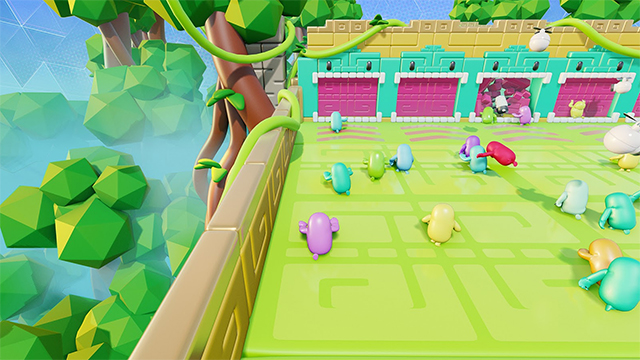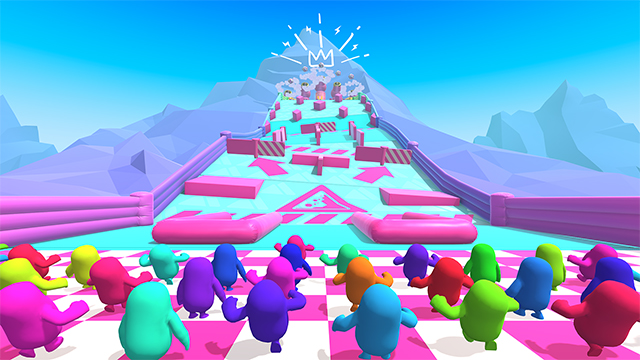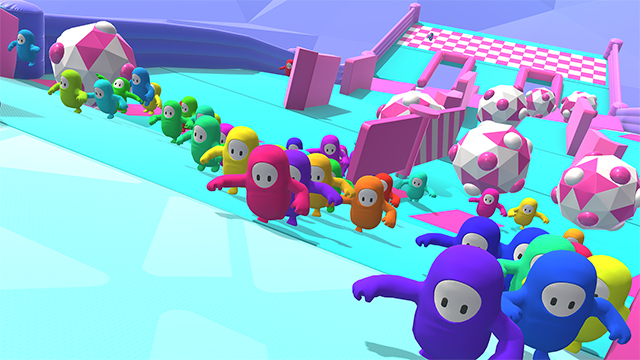Fall Guys is a silly battle royale-esque game show video full of tiny bean people just doing their best. It’s incredibly fun and while its MXC and Takeshi’s Castle influences are quite evident, the team at Mediatonic also got some inspiration from other popular real-world activities. Senior Game Designer Joe Walsh talked about the game’s early roots as well as how the team’s British roots may play into it.
GameRevolution: How did you come up with this weird idea?
Joe Walsh: So we were talking about it a lot in the studio about different multiplayer experiences, things that we thought were really exciting in the real world and started looking at game shows like MXC and Takeshi’s Castle. And we thought that no one has ever made a game that makes me feel like I’m on a game show.
There are quiz show games that are really popular and when you start to get to the end of the quiz show games, it’s super exciting. But I wanted to line up on that start line with up to 100 other people and feel like it was me versus the swinging hammers and the wrecking balls in a map up to the finish line.
GR: What inspired the art style and the design of those hilarious little bean guys?
JW: We wouldn’t call this a battle royale game but there is some battle royale DNA in there but we really wanted to inject some color and happiness and some joy into that space. When we designed the characters as well, it was a process like what is the funniest, most hilarious version of this character? It’s why they’ve got stubby little feet and big arms and round baked bean-style bodies. We wanted to make these things as funny as possible when they get hit.
We want them to be floppy and ragdoll but it’s also important that when they get hit, they get back up again and they’re full of enthusiasm. We want that joy and that energy to permeate throughout the game.

GR: How do you come with games to put in there? Because there are like 30 to 40 and it seems hard to come up with that many good ones that fit the theme and are still fun to play.
JW: One way we do it is that we have a huge spreadsheet in the office and anyone in the studio can come up with an idea and add it. We look at things from MXC and the things that worked there but we also look at games we used to play in the playground. Because a big part of this is being able to explain what you’re gonna be doing in a sentence. Like Tail Tag: keep your tail and that’s all you have to do for two minutes. Door Dash: just reach the finish line and break the doors.
It has to be simple, it has to be accessible. And that’s kind of what it was like as a kid. If you want to turn up in the playground and play something, you need to figure out the rules pretty quick if you want to play.
Also there are the massive scale multiplayer things in the real world like the Pampalona Bull Run or the thing the U.K. called the Gloucestershire Cheese Rolling where 60 people run down a hill to grab a roll of cheese and the first one who grabs it, wins.
GR: Is that how they pick the next queen?
JW: Yeah, I’m pretty sure that is how that works. And if we could just make something like that that is full of energy and full of life or anything we think is stupid, slapstick, and funny goes on the sheet. We prototype them out and the best ones make it into the game.
GR: Is this whole idea sort of a British thing?
JW: It is weirdly, eccentrically British. We have some very strange customs and traditions in our country. We have a version of MXC in the U.K. called Takeshi’s Castle and we have a different commentator and he’s dry and sarcastic. It’s very different from the U.S. version.

GR: These three games take skill but there are elements of randomness to them. How do you all make sure they are not too random?
JW: It’s something that we’re experimenting with like what is the level of level of randomness [that we want]? One thing that we found is that in even games like Door Dash, which has these doors that are randomly breakable or not, there’s skill to it that comes a little bit later where you don’t actually want to be ahead for a lot of the game because you are the one taking the risk as you are the one smashing your head into the door to figure out if it’s breakable or not. So we find there are emergent strategies that happen over time as we playtest them in the studio.
But we are definitely happy to embrace the chaos in this game. Sometimes you start at the start of the pack and sometimes slightly further back. Sometimes luck is with you. It is the same with Mario Kart and any battle royale game, really. But we are just embracing it and we want people to pick it up and have fun. And if you don’t win, you can just queue again.







